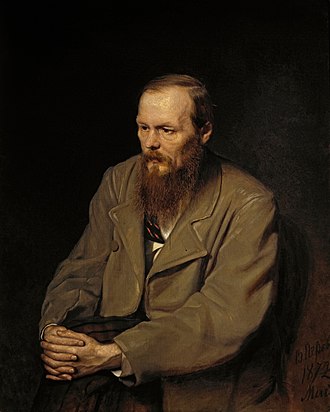
Dostoevsky was born on November 11, 1821 in Moscow, as the second of seven children of Mikhail Dostoevsky and Maria Dostoevskaya, the descendants of Belarusian immigrants. His father was a military surgeon, but also an alcoholic. It is assumed that Mikhail was killed by his serfs, who were outraged by his drunken behavior. Fyodor’s mother Maria died of tuberculosis when he was only sixteen.
Fyodor enrolled in the Military Academy in St. Petersburg, but since he was not good at mathematics, he decided to focus on writing. He received great reviews for his first work, Poor Folk, published in 1846.
He was arrested after having his short story, White Nights, published. Accused of taking part in revolutionary activities against Tsar Nicholas, he was sentenced to death. However, Dostoevsky was pardoned and exiled to Siberia after a fake execution.
This was his life’s turning point. This experience made him change his political views and return to traditional Russian values and the Orthodox faith.
In Siberia, the number of epileptic seizures, he was genetically predisposed to, increased. He was released from prison in 1854 to serve in the Siberian Regiment. He spent five years there as a lieutenant in the Seventh Line Battalion, stationed in the fortress in Semipalatinsk, in present-day Kazakhstan.
He described Siberian prison life in his novel The House of the Dead. After his release from prison, he met, and later married, Maria (Masha) Dmitrievna Isaeva, a widow at the time. Unfortunately, Masha fell ill and died in 1864, as did Fyodor’s brother soon after.
That was a great loss for Dostoevsky, and the introduction to an extremely difficult period in his life, marked by depression and financial problems, as he had to support the family of his deceased brother. He tried to make money by gambling, but that vice got him into even more trouble.
He wrote one of his best works, Crime and Punishment, in record time, in order to pay off debts. This brought him fame, but it did not make him wealthy.
In 1864, Dostoevsky published the great Notes from Underground, one of the most intense confessional short novels.
He continued to gamble n Germany, where he met his great love, Apollinaria Suslova, a student, on whom he based the character of Polina Alexandrovna in the novel The Gambler. Apollinaria refused to marry him, but Fyodor very soon met Anna Grigoriyevna, a twenty-year-old stenographer, whom he married in 1867.
Fyodor and Anna had four children. Ana has put him back on the right track, and he dedicated his last novel, The Brothers Karamazov, to her.
He died on February 9, 1881 in St. Petersburg, from the consequences of bleeding caused by an epileptic seizure.
He was buried in the Tikhvin Cemetery near the Alexander Nevsky Lavra in St. Petersburg, Russia.

